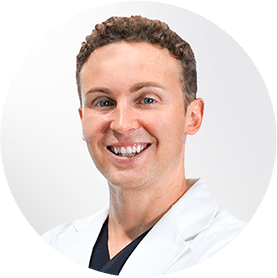5 Questions About Acute Low Back Pain, Answered by Renowned Back Pain Doc in Paramus
July 26, 2021
Acute low back pain is defined as relatively short-term discomfort, often accompanied by stiffness and muscular tension. It can occur anywhere in the bottom part of the back and it can spread towards the buttocks area. What differentiates acute pain from chronic back pain is, among others the duration of your discomfort. In case of acute back pain, the discomfort should be completely gone in about 12 weeks. Anything longer than that signals a chronic condition that should be addressed immediately.
Back pain and its symptoms are often subjective, and it can sometimes be difficult to identify what triggered it with medical tests. This is why, in most cases of acute back pain, the body is left to do its job and repair the damaged tissue, administering only pain medication and minimally invasive treatment to help make the symptoms more bearable.

Fortunately, nonspecific low back pain usually goes away on its own within a few weeks. However, getting the right therapy early on will ensure that the acute pain won’t become a chronic issue. To help you get a better understating of your condition, Dr George Hanna, a board-certified back pain doc in Paramus is here to answer a few questions regarding acute low back pain.
Who is at risk for acute low back pain?
According to Dr George Hanna, adults aged 35 to 55 are the most vulnerable to acute low back pain. Spending a lot of time in the same position, such as working at a desk all day, contributes significantly to an elevated risk of this sort of discomfort. Excessive physical work, frequent bending and twisting, which can lead to disc herniation, and lifting represent risk factors as well.

Medical data also shows obese patients are more likely to develop acute, as well as chronic back problems than individuals who maintain a healthy weight. Alcohol consumption and smoking are also contributing risk factors for developing back pain, neck pain, and issues with the overall bone structure.
What can cause acute low back pain?
Most of the time, acute low back pain is classified as “non-specific,” which means that the doctor can’t determine what is causing it. This may be irritating to you as a patient, but remember that therapy, and often simply waiting it out, can be beneficial in pain alleviation.
Diagnostic imaging scans are typically not required unless your doctor notices symptoms of a complex health issue. If the discomfort persists despite pain management therapy, such testing may be beneficial.
Acute low back pain can be caused by disc conditions, vertebral fractures, muscular strain, and ligament sprains.
What are the treatments available?
Acute low back pain is usually treated with pain medication, a bit of physical care, and by following your doctor’s advice. If you are used to working out, your back doctor will most probably advise you to keep active but may ask you to adjust your routine according to the pain.
Over the counter (OTC) or prescription pain medicine are generally recommended at first, together with medical advice on how to care for your back. If initial treatment fails, your back doctor may recommend physical therapy, chiropractic treatments, or other forms of minimally invasive treatment.
Because most primary care physicians have minimal experience in interventional pain management, patients are often not satisfied with the type of treatment received. In this instance, feel encouraged to ask your doctor for a referral to a specialist or a physical therapy prescription.
How can I keep acute pain from becoming chronic?
Acute back pain can sometimes progress to a chronic state. There are two possibilities for this to occur:
First, if inflammation and associated scar tissue are not controlled, they might reduce flexibility, potentially leading to further tissue damage. Muscle spasms and trigger points can also be caused by scar tissue.
Second, your body may experience changes over time that cause your nervous system to erroneously magnify and distort feelings, resulting in a chronic pain condition.
Early administered treatment and regular exercise are two of the most effective strategies to prevent acute back pain from progressing to chronic pain.
If you want to prevent acute back pain from ever coming back, strengthen your muscles and flexibility with exercises that involve proper alignment. Yoga, Pilates, and other core strengthening routines require you to work your whole body, training your muscles to withstand the daily activities that stress them.
Body mechanics may also play a role in avoiding acute low back discomfort. When lifting large things, for example, bend from the hips and knees rather than the back. This is beneficial to your spine since your legs and hips are larger and stronger and can support more weight.
Should I get medical assistance?
Despite most cases of acute back pain usually healing on their own, symptoms can sometimes be difficult to bear, in which case seeking the help of skilled back pain specialists can be a critical step in your recovery. This way, you can prevent the potential apparition of more complex back issues that may require more complex therapy.
During your first appointment, your back doctor will ask you several questions, to determine your medical history, and conduct a physical exam as well. The information they obtain at this session will assist in diagnosing your pain by categorizing you as having non-specific low back pain, nerve-related pain, or pain caused by other reasons.
Further tests and the type of therapy you should consider will be determined after diagnosis.
If you fear your acute low back pain may be a sign of a more serious condition, don’t hesitate to contact us today. Under the guidance of our medical director, our back pain doctors use state of the art equipment to make sure patients are properly diagnosed and receive the best possible treatment options. We are available in multiple locations throughout New York City and New Jersey, but if you’re looking for a back doc in Paramus, you can schedule an appointment at our Paramus clinic on Route 17, near the Paramus Park Mall.
Book a Consultation
Scheduling a consultation with one of our pain treatment specialists is one of the best ways to determine the proper solution for pain relief.
Meet Our Team of Back Pain Specialists
All of our Pain Doctors in New Jersey are Harvard Trained and Board Certified in Pain Management

Back Pain Doctor Clifton & West Orange NJ
Dr. George Hanna
Dr. Hanna is a Harvard Trained back specialist in New Jersey and New York. He serves as Medical Director of Pain Management.

Back Pain Doctor Clifton & West Orange NJ
Dr. Laura Lombardi
Dr. Lombardi is a Harvard Trained back pain treatment doctor, currently seeing patients in Clifton and West Orange, New Jersey.

Back Pain Doctor Clifton & West Orange NJ
Dr. Shane Volney
Dr. Volney is a Harvard Trained back treatment doctor seeing patients in the NJ areas of Clifton & West Orange, and in NYC.

Back Pain Doctor Clifton & West Orange NJ
Dr. Michael Nguyen
Dr. Nguyen is Harvard Trained and Board Certified in Pain Management. His pain center accepts major medical insurances and Medicare.

Dr. George Hanna

Dr. Laura Lombardi
Dr. Lombardi is a Harvard Trained back pain treatment doctor, currently seeing patients in Clifton and West Orange, and Paramus New Jersey.

Dr. Shane Volney
Dr. Volney is a Harvard Trained back treatment doctor seeing patients in the NJ areas of Clifton & West Orange, and in NYC.

Dr. Michael Nguyen
Dr. Nguyen is Harvard Trained and Board Certified in Pain Management. His pain center accepts major medical insurances and Medicare.
